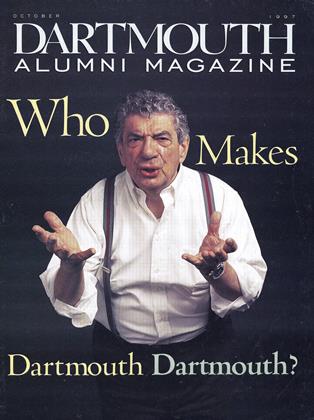Local Wags
RESEARCH DOESN'T REVEAL whether Eleazar Wheelock owned a dog. Chances are he did, probably a working dog for his farm, because there have always been dogs at Dartmouth. Good dogs and bad dogs. A few have created news bites, others just—well, they're just here, adding to the ambiance, helping make Dartmouth Dartmouth, occasionally getting into trouble.
friends. There probably isn't anyone—student, professor, alum—who can't name a favorite Dartmouth pooch, past or present: Thor, Dammit, Mad Dog, Argus, Elmo, Booter, Ed- son the guide dog, the history department's Bentley, Wilson Hall's Skunk, Pike House's Maggie.
Pets, of course, have long been verboten in dorms and in all other College-owned residences and dining halls. That led, 80 years ago, to The Dartmouth editorializing that the College should "provide individual kennels outside each building." For reasons lost in history, this was never done.
Today there's a new generation of dogs in town, and for the most part they are well treated, reasonably well contained, and add to the College's character. "They definitely have a great life," brags a member of Theta Delta Chi. Lots of head scratches, hugs, Frisbee tossings, and playful roughhousing.
But there's a dark underbelly to this picture.
Hanover dogs also do what comes naturally: digging, running in packs, protecting their territory, fouling walkways, fighting one another, chasing moving objects, and looking for food. Hanover law decrees that every dog must be accompanied by and under the control of the owner. But flouting laws they cannot read, some dogs menace joggers, bicyclists, food-service employees, mailmen, paper boys, pizza delivery people, College workers. Theta Delt's Zeke and Zeta Psi's Mackenzie have rap sheets downtown. Alpha Delta—model for the movie Animal House—is famous for its dogs, too. Several years ago, having renounced its affiliation with the College, Alpha Delt actually registered with the town as a kennel [Emphasis ours].
As they have for decades, the dogs of Dartmouth continue to roam free. Some end up at the Upper Valley Humane Society, which refuses to give dogs to Dartmouth students. Paradoxically, many of the shelter's volunteers are Dartmouth students, farther evidence of the strength of the College's canine connection.
So, maybe everything isn't always kibbles and pats for campus dogs, but is there light at the end of the kennel? Given the history of man's best friend at Dartmouth, it seems likely that 50 years from now, well into the twenty-first century, there will still be dogs padding around Hanover—and dog articles in this magazine.
Freddie, keeping her master Tori Storm '92 off her leash, laps up sunshine on the Green.
 View Full Issue
View Full Issue
More From This Issue
-
 Cover Story
Cover StoryPeter Bien
October 1997 By Robert Sullivan '75 -
 Cover Story
Cover StoryM. Lee Pelton
October 1997 By Jane Hodges '92 -
 Cover Story
Cover StoryMarysa Navarro-Aranguren
October 1997 By Holly Sorensen '86 -
 Cover Story
Cover StoryThey Make Dartmouth Dartmouth
October 1997 -
 Cover Story
Cover StoryWilliam Cook
October 1997 By Heather McCutchen '87 -
 Cover Story
Cover StoryChris Miller '97
October 1997 By Jake Tapper ’91
Robert Nutt '49
-
 Article
ArticleThe Doctors' Dilemma
Novembr 1995 By Robert Nutt '49 -
 Cover Story
Cover StoryWarner Bentley's Bust
OCTOBER 1997 By Robert Nutt '49 -
 Article
ArticlePaddling Freshmen
NOVEMBER 1998 By Robert Nutt '49 -
 Sports
SportsFarm Team
MAY 1999 By Robert Nutt '49 -
 Feature
FeatureFENG SHUI COMES TO DARTMOUTH
July/Aug 2002 By ROBERT NUTT '49
Features
-
 Feature
FeatureCLASS ACHIEVEMENTS 1962 FUND
NOVEMBER 1962 -
 Feature
FeatureTHE 18th century highboys of Benjamin Randolph's
April 1976 By ALLEN L. KING -
 Cover Story
Cover StoryHow to Find Your Inner Santa
Sept/Oct 2001 By ARTHUR H. RUGGLES JR. ’37 -
 Cover Story
Cover StoryClimbing the Hill
Nov/Dec 2007 By DIRK OLIN ’81 -
 Feature
FeatureNotebook
Sept/Oct 2008 By JOHN SHERMAN -
 Feature
FeatureThe West That Wasn't
November 1982 By R.E.


